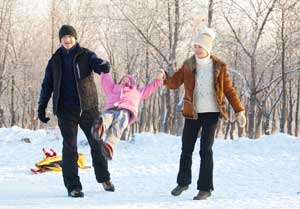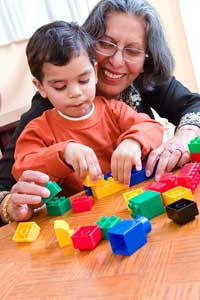
There are two ways to address the stress of caregiving: reducing the stressors by increasing your knowledge and skills, and/or reducing the feelings of stress by using coping strategies. The lettered modules of this course provide useful information to help you address specific stressors. The remainder of this module is devoted to coping strategies.
Many of the physical symptoms of stress—such as muscle tension, headaches, backaches, digestive problems and sleep problems—stem from the body being in a state of tension for too long. Practise relaxation techniques on a regular basis. These techniques include the following:
- Deep breathing
- Stretching exercises for the neck, shoulders, arms and upper body
- Stretching exercises for the legs
- Autogenic training
- Visualization
 Although seeking pleasure
may make you may feel heartless, selfish or guilty, doing something that makes you feel good is rejuvenating and affirms life. You can be a better caregiver when you have pleasure in your life.
Although seeking pleasure
may make you may feel heartless, selfish or guilty, doing something that makes you feel good is rejuvenating and affirms life. You can be a better caregiver when you have pleasure in your life.
Pleasure can be as simple as the feel of soft fabric next to your skin, watching a small bird in a tree or at a bird feeder outside your window, a walk through a park or garden, or eating a dish of ice cream. Pleasures can be small and cost little or nothing. Anything that makes you smile or laugh can relieve stress.
 Well-functioning families spend time
together and apart. If you volunteered somewhere or engaged in hobbies or recreational activities before you became a caregiver, it is important to maintain at least some of those activities and connections. The more activities you are able to maintain,
the better you will feel and the less likely you will have a sense of loss as a caregiver.
Well-functioning families spend time
together and apart. If you volunteered somewhere or engaged in hobbies or recreational activities before you became a caregiver, it is important to maintain at least some of those activities and connections. The more activities you are able to maintain,
the better you will feel and the less likely you will have a sense of loss as a caregiver.
In addition to staying active in your personal community, it is important to stay physically active. Exercise increases blood circulation, can help get the kinks out of your muscles and be a form of physical meditation. There are physical activities for all levels of ability and interests. If you visit the local pool or recreation centre at a regular time, you are likely to meet other “regulars” and may expand your social circle at the same time as you exercise.
 Eat regularly. Make stress-relieving
activities a regular part of your day. And make this routine known to your loved one and others in your social network so that they can support you to stick to that routine by encouraging you and providing respite care if needed.
Eat regularly. Make stress-relieving
activities a regular part of your day. And make this routine known to your loved one and others in your social network so that they can support you to stick to that routine by encouraging you and providing respite care if needed.
It is easy to get caught up in the idea that caregiving must be added on to your former routine (if you had one), creating a too-full set of commitments. Re-think traditions, especially weekend events and holiday traditions. Plan based on what is realistic to do. If someone misses a particular tradition, put them in charge of making it happen.
Don’t be “guilted” into taking on more responsibilities and wearing yourself out. Take control by making decisions and organizing your personal life for maximum comfort.